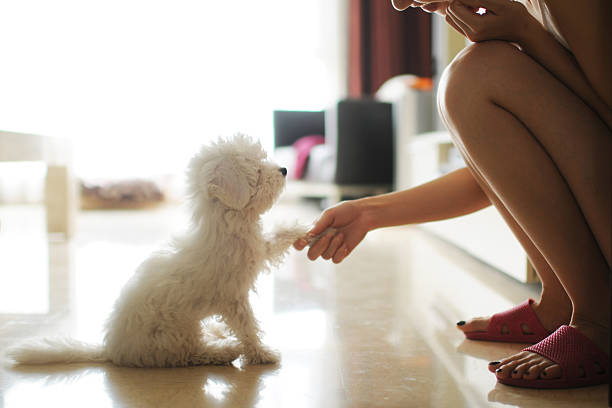Puppy Training Class vs. In-Home Training: What’s Best for Your Pup?

Choosing the right training path for your new puppy is one of the most important decisions you’ll make as a dog owner. With so many options—group classes, private sessions, local puppy training schools—how do you know what’s best?
Should you enroll in a structured puppy training class, or is in-home training the better fit for your lifestyle and your dog’s unique needs?
In this guide, we’ll compare both options to help you confidently choose the right foundation for your pup’s behavior, confidence, and future success.
The Importance of Early Puppy Training
Before we dive into formats, let’s be clear—early training is essential. Puppies are in their most impressionable stage between 8 to 16 weeks. This is the ideal window to teach basic obedience, social boundaries, and introduce them to new environments.
Delaying structure often leads to behavioral issues like:
Jumping
Biting or nipping
Fear-based reactivity
Difficulty with recall and leash manners
Excessive barking or housebreaking delays
A professionally led dog training class or private puppy training program provides the structure and social learning your puppy needs to thrive.
What Happens in a Puppy Training Class?
A puppy training class is a group-based setting where multiple puppies and owners train together under the guidance of a professional trainer. These classes often take place at a training facility and follow a structured curriculum.
Benefits of Group Puppy Training Classes:
Socialization: Your puppy learns how to interact safely with other dogs and people
Distraction-proofing: Commands are reinforced in real-world, stimulating environments
Routine structure: Classes follow a weekly progression, helping you stay consistent
Peer learning: You see how other pet owners navigate challenges
Affordability: Often more cost-effective than one-on-one sessions
If you’re searching for local puppy training in Miami, a class-based program like ours at K-9 Specialist can give your pup early exposure to group dynamics—crucial for long-term confidence.
What Is In-Home Puppy Training?
In-home training offers personalized guidance in your dog’s natural environment. A trainer comes to your home, evaluates your puppy’s behavior, and customizes the training plan based on household needs.
Benefits of In-Home Training:
Tailored solutions: Great for specific behavior issues like housebreaking or crate anxiety
One-on-one attention: Every session is focused solely on your puppy
Convenient for busy owners: No travel, flexible scheduling
Training in real-life environments: Your pup learns to behave at home, on your street, or around your family
In-home sessions are ideal when your puppy struggles with fearfulness, aggression, or specific home-based issues like barking at the door or resisting leash training.
Puppy Training Class vs. In-Home: Which Should You Choose?
| Feature | Puppy Training Class | In-Home Puppy Training |
|---|---|---|
| Socialization | High (group setting with other puppies) | Low to Medium (limited exposure) |
| Personalization | Medium (general curriculum) | High (customized for your pup and home) |
| Behavior Correction | Basic (common puppy behaviors) | Advanced (anxiety, aggression, housebreaking) |
| Convenience | Requires travel to facility | Done at your home |
| Cost | Usually more affordable | Typically higher investment |
| Distraction Training | Excellent (controlled chaos builds discipline) | Limited (can be arranged in nearby settings) |
Our Recommendation at K-9 Specialist
At K-9 Specialist, we believe both approaches have their place—but your choice depends on your puppy’s personality and your lifestyle.
Choose a Puppy Training Class if:
You want to build social confidence
Your pup is friendly but unfocused
You want structure, routine, and community learning
Choose In-Home Puppy Training if:
Your pup struggles with fear, aggression, or overstimulation
You need tailored support for housebreaking or obedience
You prefer a more private, flexible schedule
Our Miami-based programs offer both private and group puppy training, so you never have to choose between them—we’ll build the right path for your dog’s success.
Frequently Asked Questions
Is my puppy too young for training classes?
As long as your puppy has received its first round of vaccinations and is at least 8 weeks old, they can join a group puppy class.
What if my puppy is too shy or fearful for a group setting?
We recommend starting with in-home sessions to build confidence, then gradually transitioning into a local puppy training class once your dog is more comfortable.
How long does a puppy training program last?
Most group classes last 4–6 weeks. In-home programs can vary based on your dog’s progress and behavior goals.
Final Thoughts: Build a Foundation That Lasts
The best training method is the one that meets your puppy’s needs and sets them up for lifelong success. Whether you choose a structured puppy training class or personalized in-home training, early obedience and socialization are key.
If you’re in Miami or South Florida, K-9 Specialist offers results-driven local puppy training programs tailored to your lifestyle and your dog’s behavior goals.
